Up to 8,000 people deemed to be at high risk of type 2 diabetes will be given fitness trackers as part of an NHS England scheme.
Eligible participants will also be offered 24-hour digital coaching, support and education on an app designed to encourage users to set and monitor goals.
The NHS has said that providing wearable devices to people would be a “fabulous next step in diabetes prevention”.
The prevalence of wearable tech has increased in recent years through devices such as smartwatches, fitness trackers, augmented reality glasses and connected earbuds.
Fitbit, Samsung and Garmin are among the prominent manufacturers of fitness trackers, which will be offered as part of the NHS’s new scheme. The trackers work through sensors which detect motion and use algorithms to determine how many steps a person has taken.
The NHS is looking to expand on successful pilot schemes which saw a major increase in referrals to the Diabetes Prevention Programme. The programme has been rolled out by NHS England NHS and supported by Public Health England and Diabetes UK.
A total of 68% of those referred to pilot digital schemes engaged in the programme compared with about half of people offered face-to-face support, with the online method also attracting more interest from younger people.
The digital offering will be expanded this month and offered to people who are unable to attend face-to-face sessions.
Dr Jenifer Smith, Diabetes Programme Director at Public Health England, said: “The success of the pilot’s early findings shows we are breaking new ground to help those most at risk of type 2 diabetes to literally take their health into their own hands at their own time and pace. Many of us use on-the-go digital technology every day and this is a fabulous next step in diabetes prevention.”
Diabetes Digital Media’s Low Carb Program is already offering online support to those with, and at high risk of, type 2 diabetes. Research published last year revealed that one in four users put type 2 diabetes into remission within one year.





